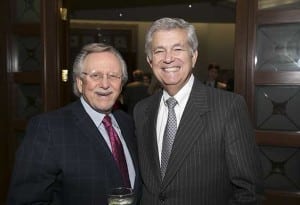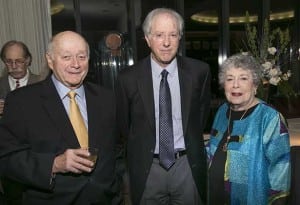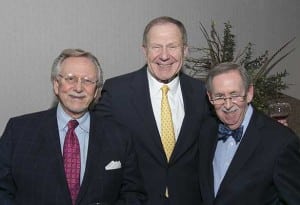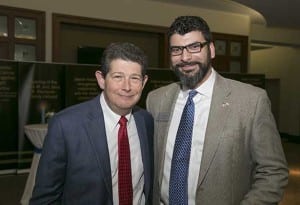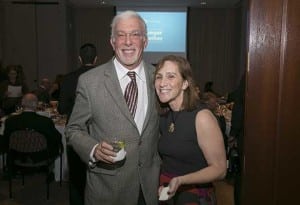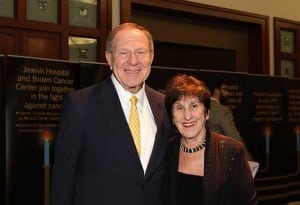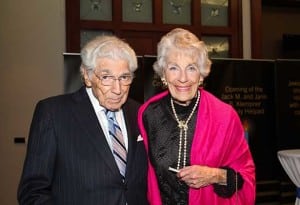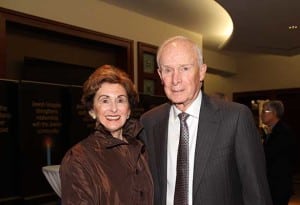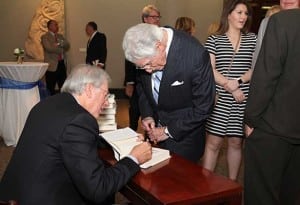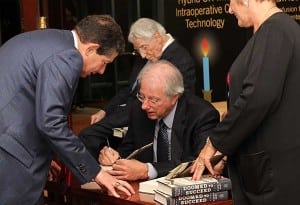 As the featured speaker at the Stronger Together 2016 Federation Campaign Major Gifts Dinner, Ambassador Dennis Ross’s lively presentation style and sense of humor kept his audience engaged as he discussed his book, Doomed to Succeed: the U.S.-Israel Relationship from Truman to Obama, and presented the realities of the Middle East as he sees them.
As the featured speaker at the Stronger Together 2016 Federation Campaign Major Gifts Dinner, Ambassador Dennis Ross’s lively presentation style and sense of humor kept his audience engaged as he discussed his book, Doomed to Succeed: the U.S.-Israel Relationship from Truman to Obama, and presented the realities of the Middle East as he sees them.
Starting with the present day, Ross stated that ISIS, a group that evolved from Al Qaeda in Iraq, “claims to embody a perfect form of Islam” and to operate under a “divine mandate.”
A divine mandate suggests that ISIS can’t lose, so to discredit ISIS’ claims, Ross contends they have to suffer defeats at the hands of other Muslims. When the U.S. attacks, we can damage them, but to defeat them, we need the Sunni Muslims to join us.
Our current policy in Syria is working against us. The U.S. is bombing ISIS targets, killing Sunnis who are members of ISIS. Russia is bombing non-ISIS targets and also killing Sunnis. To the Sunnis, Ross explained, “It appears as though we’re engaged in an onslaught against the Sunnis.” That means that Sunni states like Saudi Arabia and Sunni tribes won’t join us in the fight against ISIS.
 “Until it becomes clear that we’re prepared also to challenge Assad and Iranians,” he said, “we will not have Sunni fighters.”
“Until it becomes clear that we’re prepared also to challenge Assad and Iranians,” he said, “we will not have Sunni fighters.”
Ross attributes the rise in violence in Israel to the fact that the world is focused on ISIS and the Syrian refugee problem, and no one is paying attention to the Palestinians. The attacks are an attempt to redirect world attention.
He explained that this is not a third intifada because it lacks the structure, organization and leadership of the earlier uprisings. The attackers are young individuals who believe the Palestinian Authority is corrupt and Palestinian President Abu Mazin should resign. They’re angry because no one is paying attention to them and “they have no sense of possibility.”
The violence began in response to a false narrative that Israel was trying to change the policy governing the Temple Mount. The U.S. didn’t call the Palestinians on the lie beause of the Obama administration’s mindset that “we can’t just criticize only the Palestinians. We have to also say something about the Israelis.”
This mindset, Ross contends, “has existed within every administration from Truman until today.” It is promulgated by a constituency in the national security apparatus that looks at Israel as being a problem and not a partner.
Ross detailed the relations each president from Truman to Obama had with Israel. The only administration that really looked at Israel as a partner, he claims, was Clinton’s. The administration that was most opposed to Israel was Eisenhower.
He also reviewed the pressure various administrations put on Israel to make concessions to the Palestinians over the years. For example, in the first call George W. Bush made to Israeli Prime Minister Ariel Sharon after declaring the War on Terror after 9/11, Bush pressed Sharon not to respond to rocket attacks during the Second Intifada and to have Foreign Minister Shimon Peres meet with Yasser Arafat.
In contrast, Ross said, “Clinton believed we were Israel’s only friend in the world and because we were Israel’s only friend in the world, if we created a gap between ourselves and Israel, it would give encouragement to Israel’s enemies and it would weaken Israel’s deterrence.” There were still difference between the two countries, Ross explained, but Clinton managed them in private.
 Eisenhower thought Truman recognized Israel after its creation for political reasons. During his term, Egypt and Jordan were getting arms from the Soviet Union. When Israel asked for arms, Eisenhower advised, “seek the good will of your neighbors” even though “every single one of Israel’s neighbors rejected their existence.”
Eisenhower thought Truman recognized Israel after its creation for political reasons. During his term, Egypt and Jordan were getting arms from the Soviet Union. When Israel asked for arms, Eisenhower advised, “seek the good will of your neighbors” even though “every single one of Israel’s neighbors rejected their existence.”
Later, the U.S. did begin selling arms to Israel. The only president to suspend arms to Israel as punishment was Reagan. He imposed this sanction after Israel bombed the Osirik reactor in Iraq and again when the Israelis extended their law and administration to the Golan Heights.
Despite those instances, Ross claims that Reagan transformed our country’s relationship with Israel into a partnership. “Reagan is the first president, starting in January of 1984, to create an institutional architecture that, for the first time, creates systematic cooperation with the Israelis, military to military, defense minister to the Pentagon, intelligence community to intelligence community even economics.”
Ross posited three assumptions that have been put forward in every administration from Truman to Obama by the constituency that sees Israel as a problem.
“One is that if we distance ourselves from Israel, we will gain with Arabs,” he explained. “The second is, it’s a corollary, that if we cooperate with Israel, we will lose with the Arabs. And the third is if we want to transform our position in the region and the region itself we have to solve the Palestinian problem.”
Ross challenged each premise and provided examples.
He sees the U.S./Israeli alliance as inevitable because “Israel actually is the only democracy in the region. We share values with Israel. We share interests with Israel. The same forces that threaten Israel threaten us and vice versa.”
Going forward, Ross sees continued violence and instability in the Arab world and believes the difference between those states and Israel will become increasingly stark “for a simple reason. There is one country in the Middle East that is governed by rule of law; one country in the Middle East where there’s a separation of powers; one country in the Middle East that has an independent judiciary; one country in the Middle East where there’s freedom of speech and, sadly, freedom of press; one country in the Middle East where women’s rights are respected; only one country in the Middle East where gay rights are respected; one country in the Middle East where there are regularly and unregularly scheduled elections where the loser accepts the outcome; and that one country is Israel.”






















